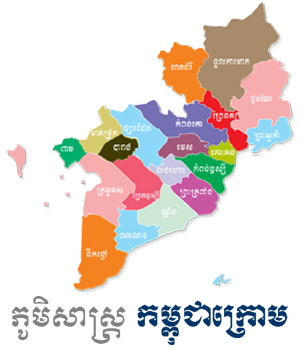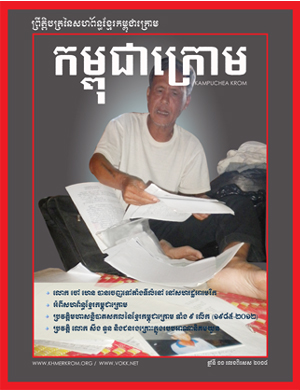In Preah Trea pang province, there is a famous ancient Khmer-Krom site, Srah Ku (or Ku Srah Srey). It is located in Ta Ku village, Sombour (Nguyet Hoa) commune, Kampong Thom (Chau Thanh) district, Preah Treapang (Tra Vinh) province, approximately 7km from the Kampong (Tra Vinh) city. The site consist a small-sized lake, surrounded by large century-old “teal” trees. Due to the run-offs by rain, the roots of the ‘teal’ trees have come right out from the ground. They are as tall as a human’s height. The lake is a square shape with 300 meters in width and 500 meters in length.

Srah Ku in Phreah Trapeag province.
The lake has fresh water species living in it and it also has plants such as Lotus and water lilies all year round. Other species such as birds are taken up the Srah Ku site as their home, turning the whole place into a natural beauty. Srah Ku is an iconic site to its Khmer-Krom people. Due to its natural beauty the state government of Vietnam has turned it into a tourist attraction site in the region. Even though the site has generated a lot of revenue for the Vietnamese government, very little of that money has been re-allocated back to the local Khmer-Krom community—the rightful owner of the heritage site.

Srah Ku.
There are two different versions of the Srah Ku’s history. The Khmer ancient story is that during the Chenla era, a Khmer King had assigned his son, Prince Batum Vong and his cousin, the Princess to journey down to Kampuchea Krom. Prince Batum Vong went to Kampuchea Krom and stayed at a place 2km away from Srah Ku. That place is called Phum Prah Sak. The Princess resided at Wat Ang (or Angara Rajaburi Buddhist temple, which is today, located next Srah Ku).
ding in Kampuchea Krom, so he proposed to his Cousin, the Princess, who happened to travel with him to Kampuchea Krom, to be his wife. The Princess adamantly rejected the idea and immediately ordered the army to dig a deep lake around her residence to stop Prince Batum Vong’s intrusion. The Princess also ordered them to build another square shape lake for her to bathe. Surrounding the lake, the Princess prohibited everyone from entering and had ordered four of her most-trusted servants—all women, to guard the four sides of the lake. These four trustworthy servants were Miss On, Miss In, Miss Sann, and Miss Sonn. Miss On was the chief among the four; this has led to the name Doun On. For centuries, Khmer-Krom people gradually call the lake “Doun Om” rather than old the name “Doun On”. Doun Om is the name known by the newcomers Vietnamese. They now call “Ao Bà Om” in Vietnamese language means Lake Miss Om.
The second version of Srah Ku legend is, during 1770s Preah Treapang was under the reign of Prince Batum Vong. The Prince had ordered all the parents to send their beautiful daughters to his Kingdom. The Prince also ordered that Khmer-Krom women must make marriage proposals to men rather than the other way around. This change had upset the Khmer-Krom women, because it was not a Khmer tradition for women to make marriage proposal to men.
The Khmer-Krom women were unhappy about the situation. One daughter of a peasant went to seek the Prince to change his mind. She told the Prince that women could not travel far from home, because women had things to learn and to do. She explained that women were very skilled at other tasks. She had also said that in terms of marriage, women preferred for their parents to make the decision on their behalf. The Prince was not convinced and had announced a competition in digging ponds (or small lakes) at night—if the men lose, they must make marriage proposal to women and if the women lose, they must make marriage proposal to men.
The women had tricked the men by hanging an oil lamp into the air to mislead them into thinking that the morning star had raised. The men immediately stopped digging after seeing the oil lamp because they had agreed to stop digging when the morning star has risen. The women continued to dig until morning. In the end, the Khmer-Krom men lost to the Khmer-Krom women.
Srah Broh is the lake that the men had dug is located at Wat Bodhivan Kampong Thmar (Thop Thmor), Phum Preah Sre, Phum Samrong (Luong Hoa) (a little south of Srah Srey). However, Srah Broh does not have the characteristic of a lake as it has been dried out due to its size and shallowness.
Source: KKF, (2009) The Khmer-Krom Journey to Self-Determination
Printed in the United States of America. ISBN 978-0-578-04392-0













